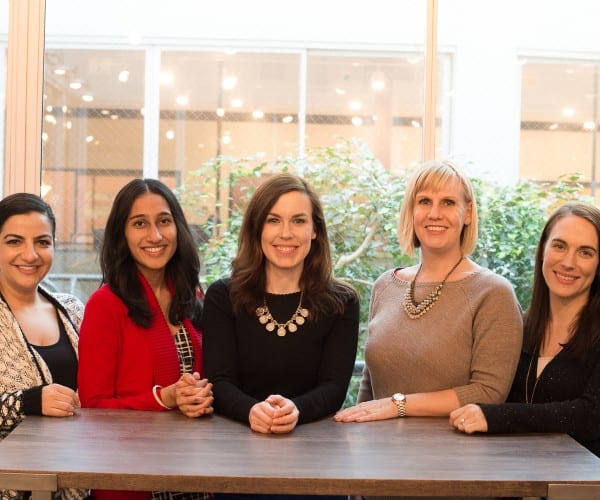Closing the Gap: Female Advisors Share Their Paths to Success
We recently discussed the reasons why women remain underrepresented in finance, with a particular focus on historical gender bias, unclear career paths, and the lack of visible role models. In our ongoing efforts to raise awareness and bring more women into this rewarding profession, we want to introduce you to an all-star lineup of female advisors at Brighton Jones.
With nearly 50 years of experience in the wealth management and financial services industries between them, Melanie Arena, Jackie Prideaux, Katie Randall, Jesica Ray, and Sabrina Rosh epitomize the principles our company lives by: compassion, collaboration, and continuous growth. And they aren’t alone—these women are just a small portion of our growing group of female advisors.
Each advisor took some time out to answer the questions below. We hope the conversation offers you insight into their careers and inspires you to fulfill your own professional passion. The transcript has been edited for clarity and length.
Interested in learning more about our work? Explore our open positions and reach out to us today!
What initially sparked your interest in finance?
Melanie: “I vividly remember taking an accounting class in high school. I loved organizing the money, balancing the checkbook, tracking income and expenses in the ledger, etc. This led me to pursue accounting as a degree in college. After working in a private company as an accountant, I learned that I was missing the human element and needed more than just the numbers to find the work rewarding. My next job was working for a single family as they came out of a liquidity event. The ability to connect the numbers to the people and their lives was just what I was looking for!”
Jesica: “When exploring career paths, I knew I wanted to build relationships with people and I knew I liked learning about finance and economics. What I didn’t know was that a place like Brighton Jones existed. When in college, I did not consider becoming a financial advisor because of the stigma in my head that financial advisors cannot be trusted. At Brighton Jones, I am able to build strong, caring relationships with clients, all the while helping them execute on smart financial decisions. When I think about my job, I feel good about what I do, knowing that we’re helping clients live a richer life every day.”
What has been the biggest contributing factor to your success?
Jackie: “Tenacity, compassion, and teamwork (okay, that’s three!). I truly believe in the ‘power of grit’ when it comes to serving as a financial planner; I’m not afraid to dig deep for answers and seek creative solutions to problems. In order to help our clients execute on what will make their plans successful, I need to tenaciously help them tackle both short and long-term objectives.
“Secondly, I consider myself someone who cares about more than the numbers—I strive to always seek compassion for the people that I work with and for. Keeping in tune with others’ emotional and psychological needs is extremely important and I believe this leads to more successful, long-lasting relationships. Lastly, and perhaps most importantly, the mentorship and collaboration of the people who surround me have teed me up for success in more ways than I can count. I cannot emphasize enough how paramount that has been on my journey to becoming a lead advisor.”
Melanie: “Two things come to mind. First, I’ve been lucky to be part of two really great firms in my career. Working around and with smart, driven, collaborative, caring people fosters an environment which allows for success. Second, my desire to build trust and create relationships with clients has been instrumental in my success. Having the answers and technical knowledge is definitely a requirement of the job, but can fall flat when trust and relationship aren’t present.”
Jesica: “In my life, I’ve always found a mentor(s) to look up to help me shape my path. I like to identify traits in people that I believe are the ‘gold standard’ and strive to improve upon myself by taking note of those traits. At Brighton Jones, the team I work with most closely includes two experienced financial planners that I look up to as mentors. Their support and confidence in me inspire me to do better and take on every challenge. Their faith in my ability has been extremely powerful in shaping my goals.”
What is the most rewarding part of your role?
Jackie: “Hearing our clients say that they fully trust us and have peace of mind as a result of our relationship with them. That, and building long-term, personal relationships with clients that go beyond just numbers.”
Melanie: “Leaving a meeting or client interaction when they state how much better they feel, is incredibly rewarding. It makes sense that clients are consumed by the day to day financial activities and sometimes worried about the overall success of their plan. When we meet with them and review the plan at a higher level, we can usually give them confidence that they are in great shape. I once had a client tell me they had cut back on their Comcast bill and stopped getting coffee, and I was able to tell them neither of those was necessary. And to call me next time before taking ‘drastic’ measures.”
Sabrina: “Knowing that I was able to help make a client’s transition to their next stage in life (whether they are buying their first home or getting ready to retire) easier. Change is tough, if I can reduce some of the stress then I’m happy!”
Katie: “Maya Angelou said, ‘I’ve learned that people will forget what you said, people will forget what you did, but people will never forget how you made them feel.’ The most rewarding part of my role is not necessarily in the doing (although the analysis and financial plan are important!) Instead I am most fulfilled when I know our clients feel more confident, clear, secure, cared for, abundant, or successful.”
What has been the biggest barrier or challenge during your career?
Jackie: “The sheer learning curve of the financial planning world. I spent two years prior to working at Brighton Jones serving abroad in the Peace Corps. While I truly believe this helped instill in me valuable lessons—compassion, empathy, working under pressure—the actual subject matter had nothing to do with financial planning, so I had to learn a great deal on the job. Our industry is constantly changing, we as a company are constantly growing and evolving, and what’s going on in the world at large daily can have a big impact. That coupled with the fact that planning areas we help tackle can be extremely complex means that life as a financial planner can be very challenging. I love it though. It keeps me on my toes!”
Sabrina: “Not being part of the ‘boys’ club.’ This has always been a male-dominated profession so finding a seat at the table can be challenging, but that doesn’t mean you can’t make room. Learning the art of negotiation and being assertive have come in handy.”
Katie: “There have been many times throughout my career that I felt that I didn’t belong. Most of the companies and teams I’ve worked in, I was the only woman in my role. Because our industry has been (and remains) male-dominated with a lack of female mentors, I craved finding more women like me as my career evolved. I’m glad I persevered because financial planning has been an extremely satisfying career that plays into strengths that women naturally have, like fostering relationships and connection. And I am encouraged to see that more young women are interested in personal finance, and look forward to helping them however I can.”
At what point did you achieve your CFP and how has that impacted your development?
Jackie: “I started taking CFP classes in September 2012 and passed the CFP board exam a little over two years later at the end of 2014. Going through that process not only provided me with an immense amount of knowledge and resources that I can draw from on the job, but I believe it proved to Brighton Jones that I was serious about my career and helped pave the way to becoming a lead advisor.”
Sabrina: “I got my CFP in 2015 and it gave me the confidence to move into a full financial planning role. Every client situation is different and unique, but throughout the process of getting the CFP you acquire the tools and resources you need to tackle even the most complicated situations.”
Jesica: “My work-hard mentality is shaped by my parents, who came to America to give my sister and I a life full of opportunity. Because of that, I am motivated by being a better version of myself every day. In terms of my career, that means expertise in the field. I came into Brighton Jones with an economics minor and some back-office investment experience, but limited personal finance knowledge. I was eager to begin the education requirement process towards sitting for the CFP because I think having real-life experience, combined with the textbook knowledge would make me a better financial planner.
“Now being more than halfway through the education requirement, I know that the coursework has made me better at my job through the working knowledge I have gained. I have a better handle on what questions to ask to apply these to client situations and uncover more learning opportunities through collaborative discussions with my colleagues.”
What advice would you provide to others who are exploring finance as a career choice?
Sabrina: “First, find a mentor. In my experience, most advisors are happy to talk with you about their experiences and challenges. Many are even willing to help mentor you through the process. Second, join your local FPA—they host a lot of great events around different financial planning topics. There is always something to learn!
Melanie: “My advice is not to underestimate the importance of developing rapport and trust with clients. You’ll have to have the smarts and knowledge to get in the door at any firm, but the relational aspect is key. Some areas of personal finance have become commodities these days, but building a lasting relationship can make the difference between being good and being great within the field.”
Jesica: “To be successful in personal finance, you should have an unwavering desire to help others, particularly with all aspects of their balance sheet. Few professions require gaining trust as part of the job, and personal finance is one of them. The relationships formed with clients are built on trust and a client can easily feel whether or not you truly care. In my opinion, this sense of care will make or break the success you experience as a trusted advisor.
“When exploring career options, the first consideration is finding your work sweet spot: What are your skills? What are your wants? What are your needs? If the answers to these questions align well with a career in personal finance, then your passion will drive you to not only love your job but gradually find yourself getting better at it. Once you’re in the field, finding mentors and valuing client relationships are both important to career progression.”
Katie: “If your strong suit is being highly analytical and detail oriented, that’s great—you’ll already be a leg-up! And keep in mind, that’s not all a financial planner does. The more nuanced part of planning comes when there isn’t a black and white answer, and you’ll need to know what is best for that specific client in that moment. You’ll do this job well by knowing your client and what is most important to them—i.e., having a meaningful connection. So, cultivating a high EQ as well as IQ will be your biggest tool. That includes being an excellent communicator, expertly navigating sensitive topics, providing coaching along the way, and being a confidant when it is needed.”
What’s the biggest misconception about the wealth management industry that you have found not to be true?
Sabrina: “That we are all stock brokers and we are trying to sell you something. Honestly, we’re not. We partner with clients to help them achieve what financial success means to them.”
Jesica: “Certain professions bring certain stigmas to a person’s mind. For me, like many in their youth, I heard the term ‘financial advisor’ when I was young and immediately pictured an over-confident male who invested money for others. Having been with Brighton Jones for two years now, I know that a ‘financial advisor’ can be much more than that. While a salesperson that is not looking out for a client’s best interest may call themselves a financial advisor, the fiduciary standard helps distinguish these advisors from those that I have come to know at Brighton Jones.
“As a Registered Investment Advisor, Brighton Jones and other firms like it, exercise their duty of full disclosure, trust, and care. This is the “secret sauce” that I believe many people don’t know about the profession; and also the reason we emphasize the importance of a trusting relationship with our clients.”
Katie: “That you can’t ‘do good’ if you work in finance. The wealth management industry comes with some nasty stigmas about misguiding investors and being all about the bottom line. Those stigmas are understandable in the wake of the 2008 financial crisis and numerous Ponzi schemes in the news. Given that, people might think you’ll be selling your soul to work in wealth management. I can wholeheartedly say that isn’t true! The important part is aligning yourself with a company that believes in doing good (the right thing) and doing well (being successful). It may take a bit of due diligence, but I believe people will know the difference when they experience it.”
What aspect(s) of workplace culture are most important in fostering greater diversity?
Jackie: “In my humble opinion, the most important first step is actually understanding why we want more diversity. I want to be in a workplace that understands the benefits this can bring first and foremost—the ability to relate better to more diverse clients, innovation of ideas, recruiting top talent. On the innovation piece, diversity of thought can be just as important as diversity of gender or race when it comes to moving forward (down with groupthink!). It’s important to cultivate employees who understand this and who are inherently inclusive, curious, and compassionate towards others as well. If we engage with the world as a group of employees who are none of those things, we won’t attract a diverse talent pool—and we certainly won’t keep them.”
Katie: “Allowing many paths for what a successful employee is/looks like. If “winning” or being a star employee is only recognized as being one way, it will be impossible to foster a diverse culture. Employees need to envision their authentic selves as succeeding in a culture, instead of trying to fit into a cookie-cutter approach.”
We’re all looking for a good read. What’s a book you would recommend to others?
Jackie: “One of my all-time favorites is Into Thin Air by John Krakauer. The true story of the ill-fated Mt. Everest expedition of 1996, it’s one of those books that keeps me up way past my bedtime every time I read it!”
Melanie: “I love to read novels, whether period pieces, humor or drama. I’m lucky to have several co-workers who share books and recommendations. By way of this group, I’m currently reading Where’d You Go, Bernadette, which is based in Seattle. It’s funny, written in a unique format and being made into a movie (which I can totally see!).”
Katie: “I loved The Big Leap by Gay Hendricks. In this book, the author describes how we all have a calling but we might be short-circuiting or “upper limiting” ourselves. He guides you through your Zones of Incompetence, Competence, Excellence and Genius, and how to make the leap to Genius (where you were meant to be.)”
Read more from our blog:





